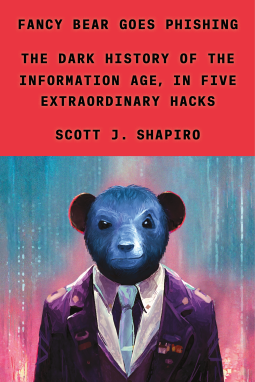
Fancy Bear Goes Phishing
The Dark History of the Information Age, in Five Extraordinary Hacks
by Scott J. Shapiro
This title was previously available on NetGalley and is now archived.
Send NetGalley books directly to your Kindle or Kindle app
1
To read on a Kindle or Kindle app, please add kindle@netgalley.com as an approved email address to receive files in your Amazon account. Click here for step-by-step instructions.
2
Also find your Kindle email address within your Amazon account, and enter it here.
Pub Date May 23 2023 | Archive Date Jun 30 2023
Description
“Unsettling, absolutely riveting, and—for better or worse—necessary reading.” —Brian Christian, author of Algorithms to Live By and The Alignment Problem
An entertaining account of the philosophy and technology of hacking—and why we all need to understand it.
It’s a signal paradox of our times that we live in an information society but do not know how it works. And without understanding how our information is stored, used, and protected, we are vulnerable to having it exploited. In Fancy Bear Goes Phishing, Scott J. Shapiro draws on his popular Yale University class about hacking to expose the secrets of the digital age. With lucidity and wit, he establishes that cybercrime has less to do with defective programming than with the faulty wiring of our psyches and society. And because hacking is a human-interest story, he tells the fascinating tales of perpetrators, including Robert Morris Jr., the graduate student who accidentally crashed the internet in the 1980s, and the Bulgarian “Dark Avenger,” who invented the first mutating computer-virus engine. We also meet a sixteen-year-old from South Boston who took control of Paris Hilton’s cell phone, the Russian intelligence officers who sought to take control of a US election, and others.
In telling their stories, Shapiro exposes the hackers’ tool kits and gives fresh answers to vital questions: Why is the internet so vulnerable? What can we do in response? Combining the philosophical adventure of Gödel, Escher, Bach with dramatic true-crime narrative, the result is a lively and original account of the future of hacking, espionage, and war, and of how to live in an era of cybercrime.
Includes black-and-white images
A Note From the Publisher
Advance Praise
"Ingenious coding, buggy software, and gullibility take the spotlight in this colorful retrospective of hacking . . . Shapiro’s snappy prose manages the extraordinary feat of describing hackers’ intricate coding tactics and the flaws they exploit in a way that is accessible and captivating even to readers who don’t know Python from JavaScript. The result is a fascinating look at the anarchic side of cyberspace." —Publishers Weekly
“This is an engrossing read . . . An authoritative, disturbing examination of hacking, cybercrime and techno-espionage.” —Kirkus Reviews
"The question of trust is increasingly central to computing, and in turn to our world at large. Fancy Bear Goes Phishing offers a whirlwind history of cybersecurity and its many open problems that makes for unsettling, absolutely riveting, and—for better or worse—necessary reading." —Brian Christian, author of Algorithms to Live By and The Alignment Problem
"Fancy Bear Goes Phishing is an essential book about high-tech crime: lively, sometimes funny, readable, and accessible. Shapiro highlights the human side of hacking and computer crime, and the deep relevance of software to our lives." —Bruce Schneier, author of A Hacker's Mind: How the Powerful Bend Society's Rules and How to Bend them Back
"Scott Shapiro's Fancy Bear Goes Phishing fills a critical hole in cybersecurity history, providing an engaging read that explains just why the internet is as vulnerable as it is. Accessible for regular readers, yet still fun for experts, this delightful book expertly traces the challenge of securing our digital lives and how the optimism of the internet's early pioneers has resulted in an online world today threatened by spies, criminals, and over-eager teen hackers." —Garrett Graff, co-author of The Dawn of the Code War
Available Editions
| EDITION | Other Format |
| ISBN | 9780374601171 |
| PRICE | $30.00 (USD) |
| PAGES | 432 |
Available on NetGalley
Average rating from 19 members
Featured Reviews
 Mechelle S, Reviewer
Mechelle S, Reviewer
I was not expecting this book to give me the deep dive into hacking it did - but I’m so glad! I don’t think I’ve ever read a book that more solidly explained a topic at the same time as delivering a compelling narrative.
I’ve been a programmer for most of my adult life, but hacking has mostly eluded me. From the origins of hacking to more recent ones - both that we’ve heard about or haven’t - this is a great history of hacking and hacking culture. I loved how accessible the technical aspects were written, even my husband who has zero tech knowledge was able to follow when I would tell him about it or read him excerpts. The stories are written like I’m talking to a friend who’s telling me about a crazy day they had at work, and the overarching narrative of security made me much more interested in the field.
This would absolutely be a good read for anyone interested in technology, regardless of current knowledge.
Readers who liked this book also liked:
Silvia Moreno-Garcia
Historical Fiction, Literary Fiction, Sci Fi & Fantasy


















